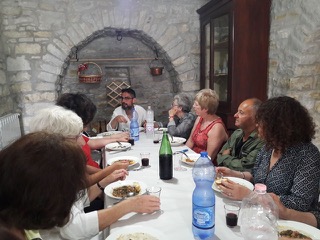 Campanilismo, translates as ‘a strong attachment to one’s town, to the land of one’s birth, and to its habits and traditions’. Is there such a word in English? Is it even a trait in English speakers?
Campanilismo, translates as ‘a strong attachment to one’s town, to the land of one’s birth, and to its habits and traditions’. Is there such a word in English? Is it even a trait in English speakers?
Well, it’s a strong trait in nearly all Italians… The word can also express rivalry and one-upmanship, literally from one bell tower to another – better to marry a girl from afar, than from the next parish. But that’s another story.
On the plus side, today it’s the reason some enlightened and energetic young people are staying put, finding ways to make a living – and keeping the land alive.
 I met Anna Maria because she had a B&B and it was thought I might use her bedrooms. And beautiful bedrooms they are – but then I discovered her vegetable garden!
I met Anna Maria because she had a B&B and it was thought I might use her bedrooms. And beautiful bedrooms they are – but then I discovered her vegetable garden!
She loves the land, and grew up in a family that’s always grown and bottled vegetables, kept chickens, produced wine and olive oil, made honey, and cured meats. It’s just what they do – apart from all having professions.
Anna Maria has revitalised and extended the family gardens and started a chilometro zero enterprise.
 Boxes of farm-to-table vegetables are delivered to local homes and restaurants from plots at 3 different altitudes – high for the legumi (borlotti, chickpeas, and lentils), medium for vegetables, and low in the valley for the grapes, oil and fruits.
Boxes of farm-to-table vegetables are delivered to local homes and restaurants from plots at 3 different altitudes – high for the legumi (borlotti, chickpeas, and lentils), medium for vegetables, and low in the valley for the grapes, oil and fruits.
How does a chickpea even grow?
Well – on a bush: harvest branches; lay in the sun; pods pop open (they literally snap, crackle and pop!); get whacked with a rake; kernels extracted; dried again; sorted, cleaned, bagged.
And then to taste, as we did, a homemade pesto – in fact, we made it ourselves! 
We shelled walnuts, fresh from the tree, (it’s very therapeutic – couldn’t get Susan to stop), collected basil from the garden, took oil from family reserves, and the pasta we’d made earlier with her mother, using eggs with great big yellow yolks. The whole day was an experience that even I hadn’t expected when I set about finding ways to integrate Italian learners, with speakers.
Enterprises like this are surely the future. Traditionally agricultural, Molise is experiencing very hard times economically, so I continue to impress on the locals that what they have is precious and irreplaceable.
I came here to learn Italian in a place without tourism or English speakers, and where people are open, available, and happy to converse with foreigners trying to grasp their language.
I found all that – and much more: clean air – no pollution, a stunning landscape, vegetables grown bio (with no chemicals), chickens truly free-range, and local food producers using ancient methods and exceptional ingredients.
Here they know where everything on their plate comes from – who cured it, who grew it, who made it (if they didn’t do it themselves). All is fresh, natural, and made with heart. Long may it continue!
Live and Learn Italian offers mature learners a chance to be immersed in a community – to practise, learn, listen and engage – in and out of the classroom.
 BrowsingItaly Sharing stories, experiences, photos, tips and all things good on Italy
BrowsingItaly Sharing stories, experiences, photos, tips and all things good on Italy

